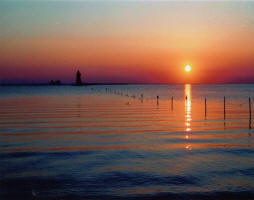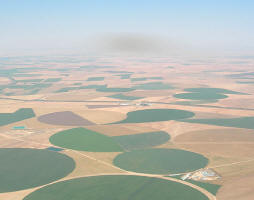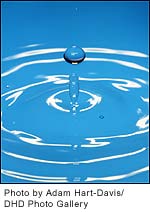 New Energy Efficient approach to the operation of Membrane Bioreactors for Decentralised Wastewater Treatment
New Energy Efficient approach to the operation of Membrane Bioreactors for Decentralised Wastewater Treatment
Water scarcity is a problem faced by all the countries of the Mediterranean area to some extent. In particular, the EU Water Initiative has identified the Southern Mediterranean as the area of highest water stress in the world. The region, with a very young and still fast-growing population, has the lowest per capita availability of water and the highest actual use of all potential freshwater resources. Most wastewater produced in urban areas of the region is inefficiently treated due to poor maintenance of the equipment and high cost of electricity (in Morocco for example, 60% of activated sludge plants are out of order [CSEC 2001]). The majority of the treatment plants in the area use activated sludge processes, followed in some cases by rapid sand filtration. These techniques were developed to reduce the suspended matter load and oxygen demand of the discharged reclaimed waters and to reduce eutrophication of the bodies of water, but not designed to remove pathogenic excreted micro-organisms. In rural and remote areas, the population have practically no access to water sanitation, whereby wastewater is directly discharged into water bodies or re-used for irrigation without treatment, thus spreading water-borne diseases and causing eutrophication and pollution of water resources.
Membrane bioreactor technology is a very promising alternative to those conventional water treatments as membranes act as a barrier against bacteria and viruses achieving a high degree of water purification. However, most membrane bioreactors currently in use have very high running costs because of the high pressure drop and high air-flushing rate required for their operation.
The Puratreat Project is an EC-funded research initiative which aims to study the application of Membrane Bioreactors as an alternative to the conventional treatment of urban wastewaters in the Southern and Eastern Mediterranean regions.
| Project number | INCO-STREP-2006-015449 | ||
|---|---|---|---|
| Subject(s) | ANALYSIS AND TESTS , CHARACTERISTICAL PARAMETERS OF WATERS AND SLUDGES , DRINKING WATER AND SANITATION : COMMON PROCESSES OF PURIFICATION AND TREATMENT , ENERGY , HEALTH - HYGIENE - PATHOGENIC MICROORGANISM , PREVENTION AND NUISANCES POLLUTION , RISKS AND CLIMATOLOGY , SANITATION -STRICT PURIFICATION PROCESSES , WATER QUALITY | ||
| Acronym | PURATREAT | ||
| Geographical coverage | Morocco, Tunisia, Spain, Syria, Jordan, Saudi Arabia, United Kingdom, Germany, Netherlands | ||
| Budget (in €) | 899986 | ||
| Programme | INCO MED (FP6) | ||
| Web site | http://www.puratreat.com | ||
| Objectives | The objective of this project is to study a new approach to the operation of
membrane bioreactors. This study will include a comparison of the three
leading membrane technologies. The operating procedure to be studied is
expected to yield very low energy consumption and reduced maintenance costs.
These characteristics would make the bioreactors working in these conditions
suitable to be operated in peri-urban areas of the Mediterranean basin,
where expenditure in public services is a critical factor. Specific Objectives:
|
||
| Results | The project comprises eight workpackages, which are described as follows: WP1. Sanitation requirements of peri-urban areasA review of the state of water sanitation services in peri-urban areas of MENA countries will be performed in this WP. This will help guide the activities to be undertaken later on research to be more relevant to real needs of the future of wastewater decentralization. The investment capacity of the areas subject of this survey will also be established. As a result of this WP a report (Milestone 1) including an overview of the current situation and requirements of sanitation services in several peri-urban areas of MENA countries. It is expected that this information is sufficiently comprehensive to be useful in the definition of requirement for sanitation services of peri-urban areas. WP2. Design, construction and control of the laboratory bioreactor.The RTD performers will design the laboratory set-up integrating the membrane bioreactor system. Special attention will be given to the ease of replacement of the different membrane modules. The laboratory reactor will be assembled in the facilities of the partner UOB. The control system will also be installed in the laboratory set-up. This WP will end up with milestone number 2, the Laboratory bioreactor plant ready for preliminary experimental evaluation. At this point, experimental set-up must be working correctly with clean water in terms of hydraulics and control. WP3. Flow Simulation and Preliminary tests -Preliminary tests, control and simulation.The flow simulation of the system will be performed in order to find the most energy-effective type of air enrichment. The hydrodynamic performance of the reactor and membrane characterising tests will be carried out in this WP. Preliminary tests with synthetic and real wastewater will be performed under standard operating conditions, to assess the fitness of the system to perform the core research activities. At the end of this WP, the experimental laboratory plant must be tested and ready to operate with real wastewater (Milestone 3). WP4. Effects of MLSS at low SRT on reactor performance.Although high values of MLSS (Mixed Liquor Suspended Solids) are desirable to achieve high volume loads and small footprint, they are directly related to an early formation of the fouling layer. In this work package, fouling analysis at different combinations of MLSS and SRT will be carried out with the three membrane modules in order to establish later the optimum compromise between fouling, energy consumption and reactor performance. The type of fouling i.e. reversible or irreversible will be determined in each experiment. Since aeration is the most energy-consuming operation in submerged membrane MBRs, the minimum required aeration for degrading the substrate will be also determined for each MLSS concentration. A microbiological characterisation will be performed for each on of the operating conditions to be studied. The milestone to be reached at the end of this WP (Milestone 4) will be a group of several sets of data with the results of the experiments carried out with different combinations of MLSS and SRT values. It is expected that the experiments are acceptably reproducible so that they can be interpreted with accuracy. WP5. Determination of flux, backwash and aeration patterns for minimal fouling operation.Given the optimum combinations of MLSS and SRT found in WP4, the optimum flux and backwash patterns will be investigated to establish their influence in the fouling process. For this, several flow modes will be tested, among them intermittent flow and combinations of this last and back flushing will be studied. The optimum flux and backwash combination will be assessed. After this, the system will be operated until fouling failure is achieved in order to define a chemical cleaning procedure. As in the previous WP, the main outcome of Work package 5 is a group of experimental data, in this case related to flux, backwash and aeration patterns. Once again here, the aim is to reliable set of data in order to draw the appropriate conclusions. WP6. Evaluation of PURATREAT.The overall performance of the system will be evaluated. Energy consumption and maintenance requirements of the system in mid-term operation will be studied. A feasibility study integrating an estimation of the operational and maintenance costs of a theoretical scale-up system as a function of the treatment load will be carried out. Possible areas for implementation of decentralised wastewater treatment plants based on the project findings will be identified. The two milestones resulting form this work package are two reports. Milestone 6, the technical evaluation of the system will include the interpretation of the experimental data obtained in the previous work packages along with a set of proposed best operating parameters for the running of wastewater membrane bio-reactors plants in small communities or peri-urban in MENA countries. The second milestone of this work package will consist of a feasibility study of a full scale decentralised MBR wastewater treatment plant for peri-urban areas including an identification of potential areas for the installation of these plants. WP7. Exploitation and know-how disseminationIn parallel to other activities during the project, the partners will pay special attention to dissemination issues in order to raise public awareness about the problems and the solutions offered by PURATREAT. In order to achieve the involvement of the government at local and national level, the feasibility report developed in WP6 will be distributed among public authorities. A project website reporting the progress of the research will be created. It is intended to include a technical forum in the website to improve communication between partners and to set the foundations for a regional wastewater network. Other dissemination activities will consist of conferences, presentations in relevant meetings and publications in wastewater journals. WP7 will finish with a report including the Plan exploitation and dissemination of the PURATREAT results. WP8. Project Management.In order to coordinate the whole project, and in parallel to all other activities, a project management work package has been designed. This work package will ensure the correct coordination, communication and co-operation between the partners and with the EC.
|
||
| Period | [01/01/2006 - 31/12/2008] | ||
 you are not logged in
you are not logged in





